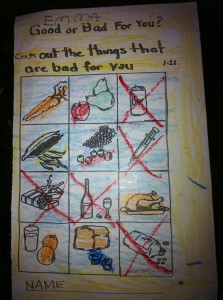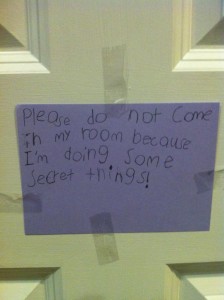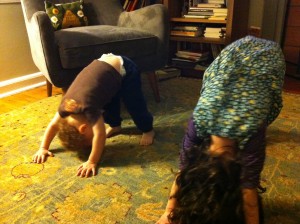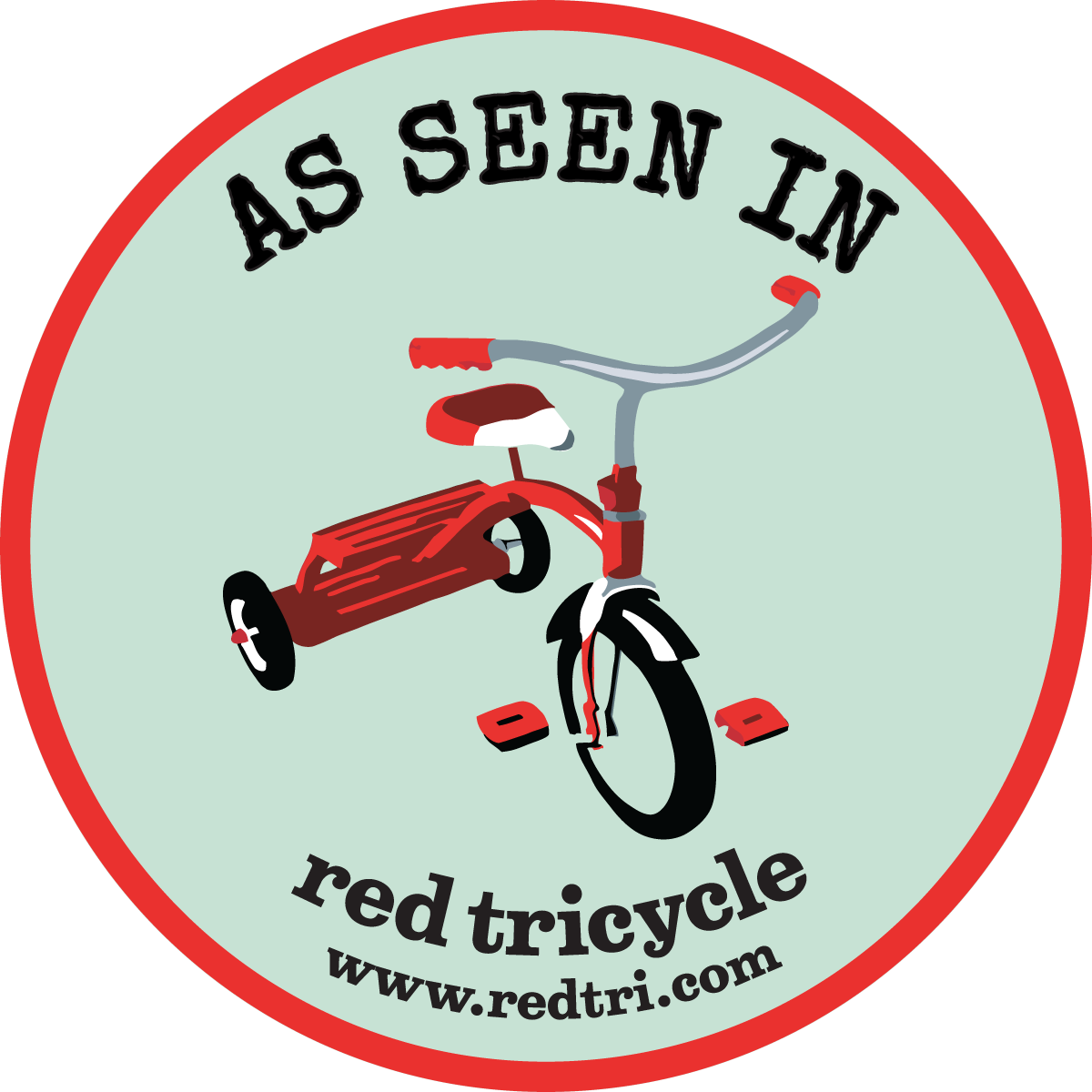I am thrilled that we are hitting our stride here on WM with the guest posts. So far we’ve had two very different voices come forward with some great topics. Today’s guest post hails from a friend, a local blogger and someone I’m lucky to have met through the internet, through WM book club and I adore keeping up with her blog. Nicole Dash, writer behind Tiny Steps Mommy, mother to four and owner of her own business addresses some very real, very important issues – ones that do not stoke the mommy wars because what she’s writing about is something I believe men and women are guilty of – but it’s one I’ve noticed along the way as well.
 Before we get started, let’s play a game. When you see someone walking into preschool – and this someone is a dad or a mom – but they are dressed totally down. Do you:
Before we get started, let’s play a game. When you see someone walking into preschool – and this someone is a dad or a mom – but they are dressed totally down. Do you:
1. Assume they are a stay-at-home parent
2. Assume they work from home
3. Think about how you’re late for work and it must be nice to be strolling in late, in yoga pants, with an empty house at home
4. None of the above
Be honest. And maybe, your answer depends on the day. For me – it would depend on the day – and how late I am. But I’m not going to pretend like I haven’t sized people up and speculated. And trust me, I know this speculation is about ME and my decisions and honestly – nothing about them.
I’ve worked full-time in a demanding job along K Street, I’ve had a nanny, I’ve stopped working full-time and been “nothing but” a stay-at-home mom, and now I run my own consulting company, sometimes I work full-time, sometimes I work part-time- but I work out of my house – so the majority of people who see me during the day assume I am a “SAHM.” My point – we are a society that needs labels and defaults on assumptions. It’s how we assess situations, evaluate the other person standing next to us and move on. This doesn’t mean it is all laced with judgement or evil. It just means we do this. Do not pretend like you don’t.
Some of us are comfortable in our decisions, proud of the choices we’ve made and just don’t get defensive or reactionary when assumptions are made – flawed or not.
Some of us are riddled with doubt and second guess our decisions every day – whether it be about working or staying home, or summer camp options, or whether we have our kid signed up for not enough or too many activities – it doesn’t have to be a big thing – it’s just something we are evaluating and second guessing and wondering about.
Some of us are confident in our decisions but every once in a while, get sick of the assumptions. Some days – that is me. Some days, I show up to the bus stop late, I am in shitty yoga pants with unwashed hair and I look a mess but I have clients breathing down my neck and deadlines to meet and more kids to get off to another school and a leaking basement – and then someone in professional clothes makes a passing comment that implies I’m “just a SAHM” (read: therefore I have really nothing to do) and I’ll stew all day. Other days I couldn’t give a rat’s ass. But that’s the point – we are all complicated beings that default on assumptions but often just don’t like it.
And THAT friends – is why I really like the post Nicole is bringing to us today. She’s pretty much had it. And she raises some excellent points on the implied value we place on the importance of tending to children all day long. In part, she’s taking on the patronizing “Oh, I don’t know how you do it” (read: I am pretty much to good for that work). And more importantly, how we value and define work.
See what you think, weigh in on the assumptions we make, tell me if you really don’t make any or maybe sometimes you do. Let’s talk. This isn’t a fight. I think it’s real and Nicole is giving it a voice. And with that, I hand it over to Nicole, of Tiny Steps Mommy.
—————————————————————————————————————————-
How would you feel if you dedicated your heart, soul and energy into a profession that gets little-to-no respect? How would you feel knowing that there are people who look down on you because of a lack of understanding, a lack of caring, or a sense that what you do is beneath them? How would you feel if you spent the bulk of your time thinking about the well-being of others only to be treated poorly?
As a home-based child care provider, I have felt this sting more than once. I speak for myself, but I know many other child care providers, nannies, and even teachers who know exactly what I’m talking about. I care for and teach children for a living. There is nothing more important than our children, yet the people entrusted with this task are often not given their due respect.
When people ask what I do for a living and I say I run a daycare from my home, there are many assumptions made. Here are a few I have had to correct more than once.
- I simply added a couple of kids to my brood for extra cash.
- I change diapers and deal with crying kids all day long.
- I have no other options.
- I have the patience of a saint.
- I am a babysitter.
- I can keep my house sparkling because I’m home all day.
- It is brainless work that anyone can do.
- It’s easy and good money.
- I sit on my butt and watch children play all day long (while keeping up with soap operas).
- I have given up on having a “real” career.
I could go on, but I won’t. I know a lot of the assumptions made are probably meant to be harmless and are born out of ignorance, but I find many of them offensive. Interestingly there are stark similarities between some of the things on this list with what some SAHM cite as stereotypes about what it means to stay home with your children.
I have to ask why?
Does it lessen the guilt of depending on someone else to care for your children if you believe the “job” can be done by anyone? Do you believe that staying home or working from home is the “easy” way to do things? Does it make you feel superior? Does the fact that we don’t wear expensive suits or wear designer shoes in make us less important?
For many child care providers, caring for children is more than a job. It is a calling and a career. There are absolutely bad providers who only do it for the money, but you can find bad lawyers and doctors guilty of the same thing.
Yes, I change diapers. Yes, I have patience (at times). Yes, I am used to crying children. Yes, I watch children play, but more importantly I watch children flourish and discover and learn and grow.
I am not the babysitter.
I am a teacher, I am a marketing manager, I am a negotiator, I am a contract writer, I am an accountant, I am an HR professional, I am a boss, I am a cook, I am a tax professional, I am a chief operating officer, I am a nutritionist, I am a nurse, I am a kisser of boo boos, I am a comforter in chief, I am a librarian, I am a princess on Mondays and a Superhero on Fridays, I am a counselor, I am a music teacher, I am a puppeteer, I am the eyes and ears of parents, I am a student, I am a referee, I am a child advocate, I am a party planner, I am a professional organizer and I am a witness to all things awesome about the secret society of children.
I am a child care provider and I love what I do because of all the reasons I can’t explain. Oh and I do not have time to catch up on soap operas and my house is far from sparkling because I am too busy working hard at my career, so you can work hard at yours.
Nicole Dash is a writer, blogger and child care business owner who lives in the suburbs outside Washington, DC with her husband and four children. Nicole writes about family, life, parenting and caring for children on her heartfelt blog Tiny Steps Mommy.
————————————————————–
Thank you Nicole! I hope others weigh in here or on the WM Facebook page! If you’d like to send me a guest post, email me at wiredmomma@me.com. Be sure to also check out Nicole’s blog Facebook page.










